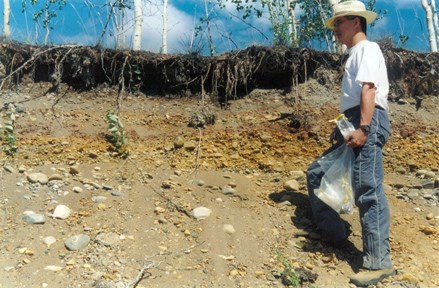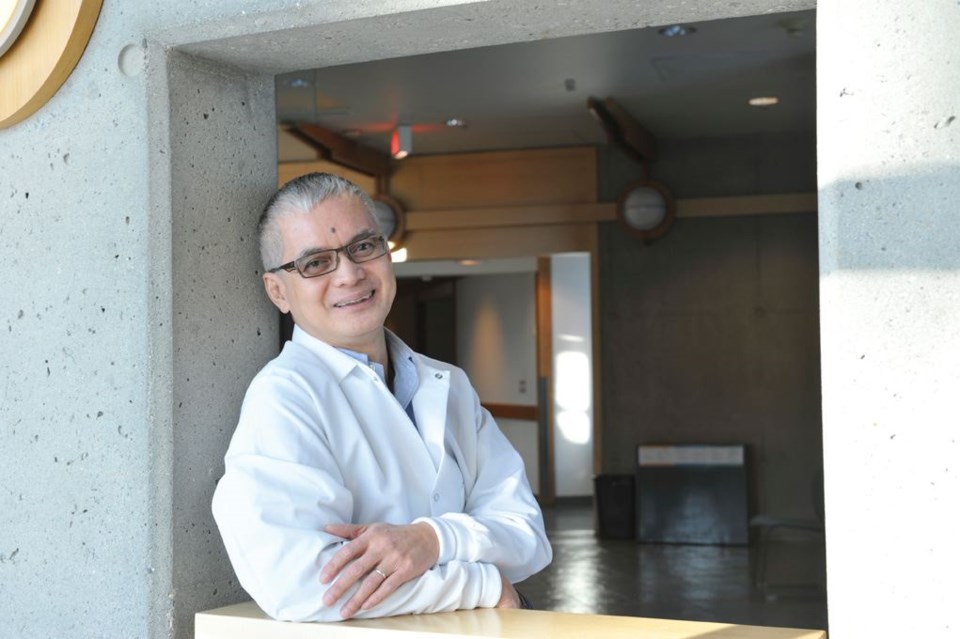One of the first concepts Joselito Arocena would impart to students was the same simple idea that helped drive his decades of research: soil is life.
"That's something he would say usually at the start of every term and trying to get that across to students. It's this magical little layer that covers the earth, less than a metre in many place. It's the integration of the air, water, ground and life," said Chris Jackson, a senior lab instructor who taught with the distinguished geochemistry professor at the University of Northern B.C. for seven years.
"That was his essence."
Arocena, known by most as "Lito," died Sunday at age 56, only a few months after colleagues learned he'd been diagnosed with cancer. His obituary said Arocena "passed away peacefully surrounded by his loving family." A funeral mass was held Tuesday and a memorial will be planned in the New Year.
Time and again Arocena's colleagues pointed to his enthusiasm, positivity and zeal for collaborative work as his defining qualities.
"He meant everything to us. He was a fantastic individual to start with. Extremely friendly and always positive," said Kathy Lewis, a professor and chair of the Ecosystem Science and Management Program, who was on his hiring committee.
An internationally-known soil researcher, Arocena was a founding member of UNBC and became its first Canada Research Chair in 2001. He was also one of 10 faculty who founded the Natural Resources & Environmental Studies Institute (NRESi) - with a mandate of collaboration among diverse experts - which this year gave him its Lifetime Achievement Award.
"He was a phenomenal scientist. He did some incredible research," said Lewis, pointing to Arocena's prolific resume of published works.
As of December 2014, he'd authored 105 peer-reviewed journal articles and book chapters, 56 of which held the names of NRESi as co-authors.
"He was one of the driving forces behind the creation of that institute and probably the person who most represented what it stood for," Lewis said. "He was a fantastic scientist but I think what stands out most in my mind was his absolute passion for this idea of an interdisciplinary approach to solving complicated problems to do with the environment."
Most recently, Arocena focused his collaborations internationally with universities in Spain, France and China.
"He was invited to give many talks at various universities in China, and was appointed an adjunct professor, with "high-end expert status" at Wenzhou University in recognition of his substantial research collaborations," said a UNBC release in his memory.
Arocena immigrated to Canada from the Philippines as a student. He had a master's degree from the University of the Philippines, a licentiate in soil science from the State University of Ghent (Belgium), and a doctorate in soil genesis and classification from the University of Alberta.

There he met Paul Sanborn in the 1980s when both were studying under the same professor.
Later they worked together when Sanborn was at the Forestry Service.
"He was always very generous with his time," said Sanborn. "I always learned something from talking to him. We just had a very nice collaboration and friendship."
When Arocena was named Canada Research Chair for Soil and Environmental Sciences, a position opened up at UNBC.
"I owe my job to him," said Sanborn, a UNBC ecosystem science and management professor. "That's a very special connection."
With the research chair position, Arocena used the funding to include others in his work, said Peter Jackson.
"Some people would take an opportunity like that and use it to build their own area but he used it more broadly to develop UNBC," said Jackson, an environmental science and environmental engineering professor. "He's had a profound impact."
Sanborn remembers Arocena as an incredibly hard worker.
"Lito is sort of the archetypal example of the new Canadian success story. He came here as an immigrant, as a student, and built an incredible life and made a huge contribution."
The students who chose soil sciences because of him are part of his legacy.
"He really inspired students with his enthusiasm. I think it was infectious and they would hear him, they would see him and they would kind of get the bug," said Jackson, noting he was instrumental in creating a soil science minor at UNBC about four years ago.
"He was very keen and inspired a lot of people to be much more interested in something as simple as dirt," added Chris Jackson. "I think it's telling that over the years a lot of people who never thought they would get up in soil science end up pursuing it."
As much as colleagues celebrated his expertise, they were as quick to honour his attitude and personality.
There were the loafers he liked to wear, the times dancing at faculty "sock hops" and strong performances at karaoke nights.
"He was also a very fun-loving guy. I never actually saw him at a karaoke event, but that was legendary apparently," Sanborn said with a laugh. "He could be quite a character."
Arocena's cancer diagnosis came as a shock to many on faculty, when they learned in late August he would no longer be teaching and likely had months to live.
Sanborn recalled getting an email from Arocena in late September that summed up the selfless way Arocena approached life.
"He was just thanking me for helping out, taking over his course on short notice," said Sanborn. "It was typical of him."
"It's been a very difficult semester I think for most of us," said Lewis, "knowing that he was ill and hoping for the best but in the last few weeks realizing he was going to be leaving us. I still can't believe he's actually gone."
"We've lost a great one in so many different ways."



.png;w=120;h=80;mode=crop)